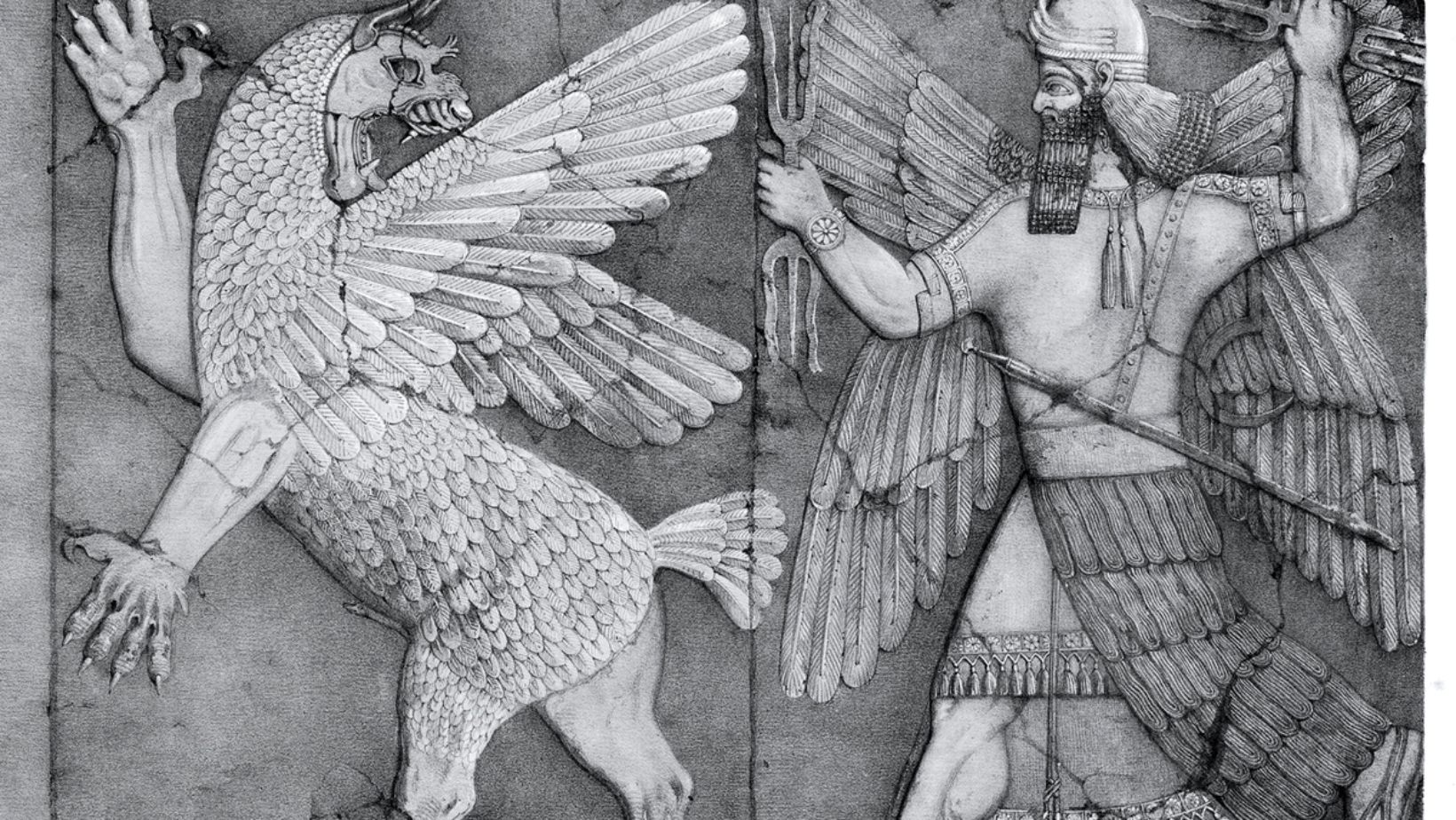Ever heard of Abzu? It’s a pretty big deal in Sumerian mythology. This primeval sea or cosmic ocean was there before the world even existed. The Sumerians believed that the universe started when Abzu Sumerian Mythology, the freshwater ocean, mixed it up with Tiamat, the saltwater ocean.
But Abzu wasn’t just some abstract concept. The Sumerians thought it was a real place, deep beneath the earth’s surface. They believed all the freshwater springs, rivers, and wells that kept them alive came from Abzu. And let me tell you, they were all about that freshwater. It was sacred, life-giving, and had some serious purifying powers.
Table of Contents:
- What Is Abzu in Sumerian Mythology?
- The Location and Characteristics of Abzu
- Deities Associated with Abzu
- Abzu in Mesopotamian Texts and Myths
- The Significance of Abzu in Mesopotamian Culture
- Creatures and Beings Associated with Abzu
What Is Abzu in Sumerian Mythology?
In the realm of ancient Mesopotamian mythology, Abzu emerges as a captivating and enigmatic figure. This primordial deity, deeply rooted in the Sumerian pantheon, embodies the very essence of the primeval waters that existed long before the creation of the world as we know it.
The Concept of Abzu: Abzu Sumerian Mythology
In Sumerian mythology, Abzu represents the vast expanse of freshwater that lies beneath the earth’s surface.
The Role of Abzu in Creation Myths
In the intricate tapestry of Sumerian creation myths, Abzu plays a pivotal role. According to these ancient narratives, the universe was born from the sacred union of Abzu, the freshwater, and Tiamat, the saltwater. Their cosmic embrace gave rise to the first generation of gods, setting in motion the grand saga of creation.
Abzu as a Primordial Deity
As a primordial deity, Abzu embodies the fundamental forces of nature that existed long before the advent of the younger gods. His presence in the Sumerian pantheon underscores the deep reverence and awe that the ancient Mesopotamians held for the life-giving waters that flowed beneath their feet.
The Location and Characteristics of Abzu: Abzu Sumerian Mythology
Delving deeper into the mythos surrounding Abzu, we uncover the fascinating details of his subterranean domain and the unique characteristics that define his essence.
Abzu’s Subterranean Location
Abzu’s realm, the freshwater ocean, is located deep beneath the earth’s surface. This hidden world, shrouded in mystery and wonder, was believed to be the wellspring of all life, nourishing the land above with its sacred waters.
The Freshwater Nature of Abzu: Abzu Sumerian Mythology
In contrast to the salty seas that covered the earth’s surface, Abzu’s domain was characterized by its fresh, sweet waters. This distinction was significant in Sumerian mythology, as freshwater was seen as the source of fertility, abundance, and purification.
The Contrast Between Fresh and Salt Water
The interplay between Abzu’s freshwater and Tiamat’s saltwater highlights the fundamental duality that permeates Sumerian cosmology. Just as the union of these two primordial forces gave birth to the universe, the balance between fresh and saltwater was seen as essential for maintaining cosmic harmony.
Deities Associated with Abzu: Abzu Sumerian Mythology
Within the rich tapestry of Sumerian mythology, Abzu is closely linked to several other deities who share his domain and influence. Let us explore the divine figures who are intimately connected to this primordial god.
Enki/Ea and Abzu
Enki, also known as Ea in later Babylonian mythology, is perhaps the most prominent deity associated with Abzu. As the god of wisdom, magic, and crafts, Enki is often depicted as residing within the depths of Abzu in a magnificent palace adorned with the treasures of the subterranean world. From this sacred abode, Enki presides over the life-giving waters, bestowing knowledge and blessings upon humanity.
Nammu, as the Mother Goddess: Abzu Sumerian Mythology
Nammu, the Sumerian mother goddess, is another deity closely linked to Abzu. In some traditions, she is portrayed as the personification of the primeval sea, giving birth to the heavens and the earth from her watery womb. Nammu’s association with Abzu highlights the generative power of primordial waters and their role in creating the universe.
Marduk’s Relationship to Abzu
In later Babylonian mythology, the god Marduk assumes a central role in the cosmic narrative. According to the Enuma Elish, the Babylonian epic of creation, Marduk emerges victorious from a battle with Tiamat, using her defeated body to fashion the world. In this context, Marduk’s relationship with Abzu is one of conquest and transformation, as he reshapes the primordial waters to establish a new cosmic order.
Abzu in Mesopotamian Texts and Myths: Abzu Sumerian Mythology
The presence of Abzu in Mesopotamian literature and mythological narratives attests to his enduring significance in the cultural landscape of ancient Sumer and beyond. Let us delve into the texts and tales that illuminate the role of this primordial deity.
The Enuma Elish and Abzu
The Enuma Elish, the Babylonian epic of creation, is one of the most significant sources for understanding the place of Abzu in Mesopotamian mythology. In this sweeping narrative, Abzu appears as part of the primordial realm alongside his consort, Tiamat. The epic recounts the cosmic battle between the younger gods, led by Marduk, and the ancient deities, culminating in the defeat of Tiamat and the establishment of a new world order.
Other Mesopotamian Texts Mentioning Abzu: Abzu Sumerian Mythology
These sources provide valuable insights into Abzu’s multifaceted nature, highlighting his role as a source of wisdom, purification, and fertility. They also shed light on the complex web of relationships between Abzu and other deities, such as Enki/Ea and Nammu.
The Significance of Abzu in Mesopotamian Culture: Abzu Sumerian Mythology
The influence of Abzu extended far beyond the realm of mythology, permeating the very fabric of Mesopotamian culture and society. From religious rituals to architectural design, the presence of this primordial deity left an indelible mark on the lives of the ancient Sumerians.
Abzu’s Role in Religious Rituals

In Mesopotamian religious practices, Abzu held a central place.Priests would draw water from wells or springs connected to Abzu, using it to cleanse sacred spaces, statues, and worshippers alike.
Abzu-Inspired Architecture in Temples: Abzu Sumerian Mythology
Many of these sacred structures featured pools, basins, or cisterns that symbolically represented the primeval waters of Abzu. These water features served both practical and symbolic purposes, providing a source of fresh water for rituals while also evoking the presence of the divine in the temple precincts.
Creatures and Beings Associated with Abzu: Abzu Sumerian Mythology
In the mythological landscape of ancient Sumer, Abzu was not alone in his watery domain. From sea serpents to storm demons, these entities added depth and complexity to the Abzu mythos.
According to the Enuma Elish, Tiamat, the primordial goddess of saltwater, was accompanied by a menagerie of terrifying creatures.
The presence of these creatures in the Abzu mythos underscores the duality that lies at the heart of Sumerian cosmology. Just as the primordial waters held the potential for both creation and destruction, the beings that inhabited this realm embodied the complex interplay of order and chaos, life and death.
Key Takeaway: Abzu Sumerian Mythology
Abzu represents the life-giving freshwater beneath the earth in Sumerian mythology. Abzu’s influence extended to religious rituals, temple architecture, and inspired tales of divine beings like Enki and Nammu.
Conclusion: Abzu Sumerian Mythology
So there you have it – Abzu, the freshwater cosmic ocean that started everything in Sumerian mythology. We’ve learned about its role in creation, the deities associated with it, and how it influenced Mesopotamian culture. From sacred rituals to temple architecture, Abzu left its mark on the ancient world.
But Abzu wasn’t just some distant, untouchable thing. They saw it as the source of all life, a powerful force that could purify and regenerate. And in a way, that’s still true today. Water is essential to our survival, and we can all appreciate the life-giving properties of a cool, refreshing drink on a hot day.
So the next time you turn on the tap or take a dip in the ocean, remember Abzu and the ancient wisdom of the Sumerians. Who knows – maybe some of that primordial magic is still flowing through our waters today.

